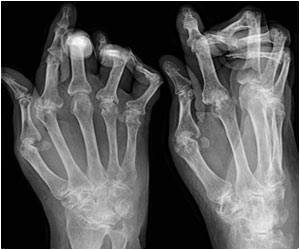
The researchers used Medicaid data to identify 8,479 JIA patients and compared them to 360,489 children diagnosed with attention-deficit hyperactivity disorder. They used pharmacy claims to determine medication use and identified infections through hospital discharge diagnoses. They found that children with JIA had an increased rate of infection, regardless of treatment strategy, when compared to children with ADHD.
"This finding suggests the inflammatory or autoimmune process itself may predispose children to infection regardless of therapy," said Beukelman.
Beukelman''s group also found that the infection rate among JIA patients was not any higher in children treated with either methotrexate or TNF inhibitors, but that the rate was significantly higher in those children treated with high-dose glucocorticoids.
"The use of a high dose of glucocorticoid, more than 10 mg of prednisone daily, was consistently associated with a doubling of the infection rate," Beukelman said. "This strongly indicates that a treatment strategy that limits steroid use may reduce the risk of serious infection in children with JIA."
Arthritis is an inflammation of the joints that causes pain, swelling, stiffness and can lead to disability. JIA is the most common type of childhood arthritis and may affect 300,000 children in the United States, according to the American College of Rheumatology.
This research was supported by grants from the Agency for Healthcare Research and Quality, the Food and Drug Administration, U.S. Department of Health and Human Services and the National Institutes of Health.
Advertisement















